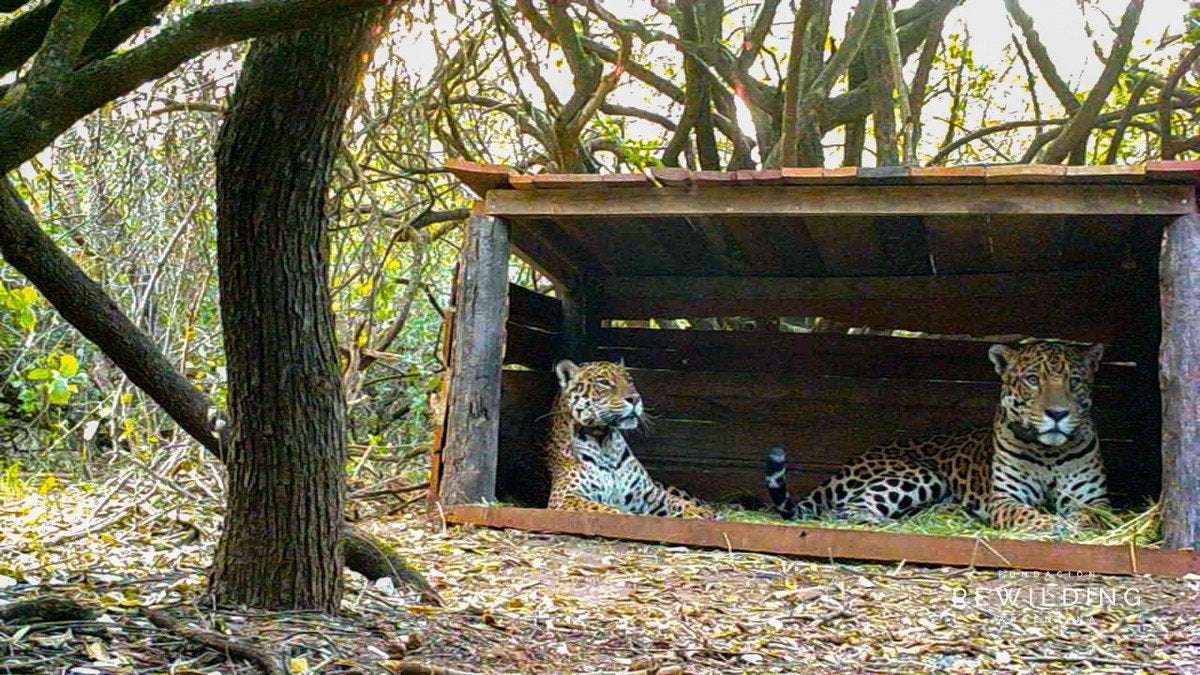BUENOS AIRES — A ranger patrolling northern Argentina’s densely forested El Impenetrable national park found a large paw print on a muddy riverbank in September 2019. Biologists thought there were no jaguars left in the park, but the print led them to find a lone male prowling the bush.
Now, the jaguar, whom scientists have named Qaramta, has found a mate after scientists carefully set him up on a blind date with a captive female. “We hadn’t seen a female in the Chaco for years, and we said, he’s going to end up dying without reproducing,” said Sebastian Di Martino, director of conservation at Rewilding Argentina, the nonprofit in charge of the project.
The team made a huge corral in the park and brought a female jaguar called Tania from their other jaguar rewilding project in the Iberá wetlands region. Qaramta visited her regularly and the two hit it off, purring like cats and nuzzling each other through the bars. Eventually, they decided to open her corral and let him inside.
“The most beautiful moment was the day that we got them together,” Di Martino said. His team watched the trap cameras with bated breath, nervous that Qaramta might be too nervous to go into Tania’s pen, or that the two jaguars might end up fighting. But the next day, they could tell from Tania’s behaviour that the two had started mating.
Jaguars can copulate 50-100 times a day, according to Di Martino. “The idea that she might get pregnant and have cubs, and that those cubs might live in freedom there… it was like the first step towards reversing a story that’s always been about loss.”
Jaguar tracks in the El Impenetrable Park in Argentina. Photo Courtesy of Rewilding Argentina.
It’s believed to be the first time in the world that a wild jaguar has mated with a captive animal. If Tania has cubs, it would be a huge step towards re-establishing a wild jaguar population in El Impenetrable, which is in South America’s vast, thickly forested Gran Chaco region. “The idea is that once they’re released, the population grows quickly,” said Rewilding Argentina director Sofia Heinonen.
Further south in Iberá, they have had some success with jaguars breeding in captivity - a female has just given birth to two healthy cubs, meaning the project there has seven jaguars that can be released into the wild in 2021.
These numbers are significant given that government figures show there are only around 250 wild jaguars left in Argentina. The largest cats in the Americas, jaguars that used to roam from the southern United States to central Argentina, but habitat loss and hunting have decimated their population.
In Argentina, the main threat to jaguars is deforestation, usually to clear land for cattle grazing or to plant crops such as soy, a practice which also devastates local indigenous communities, according to Noemi Cruz of Greenpeace Argentina. Sometimes, ranchers clear forest by setting fires, which can spiral into devastating wildfires. “I’ve heard them say, ‘If they don’t let us [use the land], we’ll set it on fire,’” she said.
In 2014, over 100,000 hectares of land were deforested for ranching in the Argentine Chaco, more than double the area deforested to plant crops. Cattle farming in forested areas was responsible for 40 percent of the deforestation in Argentina’s Chaco and Santiago del Estero provinces in 2016. Ranchers also kill jaguars because they are worried about attacks on their cattle.
Campaigners fear upcoming international trade deals will make the problem worse. A huge free trade agreement currently being negotiated between South American trading bloc MERCOSUR and the European Union would likely increase demand for South American beef, driving deforestation. The Argentine government is also working on a plan to intensively farm pigs and export pork to China, which would lead to more deforestation to grow feed for the pigs.
Jaguars are the top predator in their ecosystems and play an important role in maintaining biodiversity. Without jaguars, the herbivores they prey on multiply and degrade plant life. They also tend to prey on old or sick animals, both in the wild and on farms. “The fact that they usually prey on sick animals helps to stop bacteria and viruses from propagating,” said Heinonen. “The top predators are architects of the ecosystem.”
Rewilding Argentina, backed by international wildlife charity Tompkins Conservation, is working with local communities to develop ecotourism in the Iberá Wetlands and El Impenetrable national park. They hope this will bring jobs to the region, providing an alternative to cattle ranching and an economic incentive to conserve the natural environment.
But Cruz is worried that these schemes will be too little, too late. “The more meat the world wants to eat, the less forest we’ll have left,” she said. She suggested that everyone should have at least one meat-free day per week, and highlighted the importance of making sure that the meat Argentina exports to the world doesn’t come from places that have been deforested.
As Argentina doubles down on agricultural exports in the face of a long recession made worse by COVID, it’s too soon to say the country’s jaguars have reached a turning point. But with the two cubs born in Iberá and Tania and Qaramta mating in El Impenetrable, Di Martino is optimistic.

HoldenTite on December 5th, 2020 at 02:49 UTC »
"Kif, I've mated. Inform the men"
diatomicsoda on December 5th, 2020 at 01:47 UTC »
Imagine how embarrassing it is for that Jaguar who just wanted to fuck in peace and now he’s on the front page of a newspaper and you’re sitting there halfway around the world trying to visualise how the boned down his hoe in more detail than is necessary and you know it.
spoonfed85 on December 5th, 2020 at 01:40 UTC »
Guess it wasn't so impenetrable after all